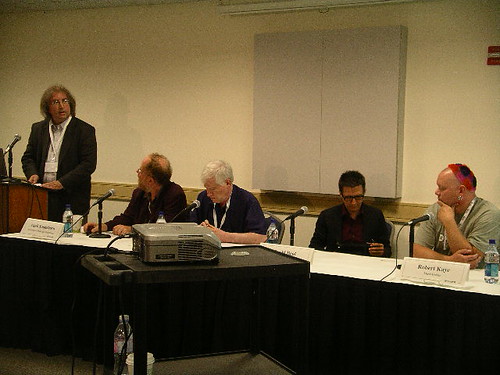David Beal President, National Geographic Music & Radio
David Freedman General Manager, WWOZ New Orleans
Robert Kaye Mayhem & Chaos Coordinator, MusicBrainz
Jon Kertzer Senior Music Producer, Zune/Microsoft
Atesh Sonneborn Associate Director, Smithsonian Folkways Recordings

04:55PM EST - AS: We mediate content at Smithsonian Global Sound in a way that the commercial market does not want to. Our genre and language list is enormous, and localized from the place where the music originates. Our fundamental promise is to make everything available always and forever.
DB: We feel that music is a great way to inspire people to care not just about the environment of this planet but also the people that live on it. We're launched the new division that I'm heading up to do just that.
[about 20 mins of technical difficulties in showing the NG promotional dvd]
05:20PM EST - RK: MusicBrainz is essentially Wikipedia for music. We have about half a million releases logged...we don't have the music itself, just the metadata concerning the music. We keep track of title, artist, label, release, barcodes if we have them. We try to get music from all time periods and walks of life. We archive everything, even if we don't like it. For example: skinhead music.
Audience poses a question regarding the expansion of metadata.
DF: The issue with metadata is being able to standardize it on an industry-wide basis.
JK: There are efforts on the part of all the major label software departments to standardize metadata; who knows how far these discussions will go.
RK: MusicBrainz is hoping to become the baseline standard, because we're out there using it.
05:42PM EST - AS: What worries me is back-up of the information. When the equivalent of the Hiroshima bomb is dropped inside the internet, what will happen to this data?
RK: We back up regularly, but more importantly, our data lives on a lot of developers' machines all around the globe. When an update is made here, its on a computer in London seventy-five minutes later. The more people are using our data, the more valuable it becomes, and allows us to supplant people like Gracenote and AMG.

No comments:
Post a Comment